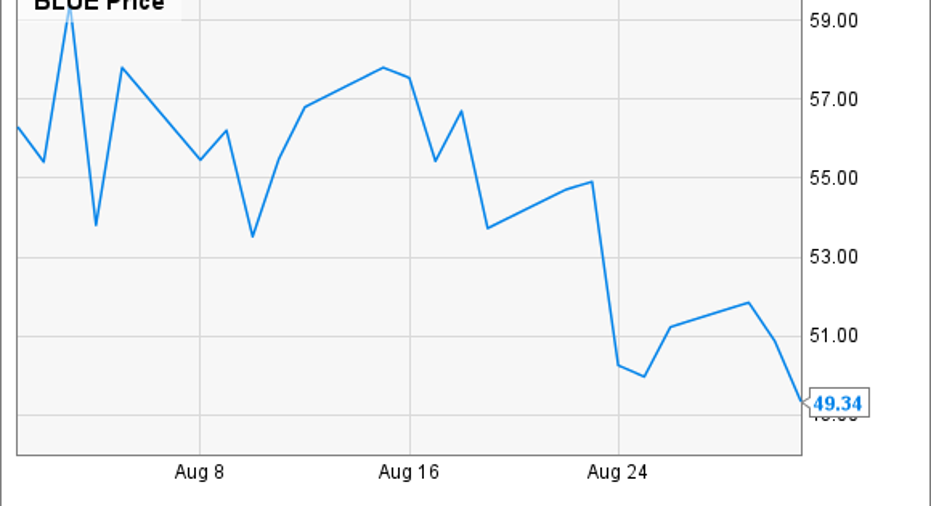3 Reasons bluebird bio, Inc. Stock Dipped 13.7% in August

Image source: Getty Images.
What: Shares of bluebird bio, Inc. (NASDAQ: BLUE)a clinical-stage biotech developing cellular therapies, fell 13.7% in August, according to data from S&P Global Market Intelligence. A larger-than-expected loss in the second quarter, important new relationships for CAR-T rival Juno Therapeutics (NASDAQ: JUNO), and Novartis' (NYSE: NVS) decision to dissolve its cell and gene therapy unit left little enthusiasm for Bluebird's stock.
So what:Near the beginning of the month, Bluebird posted a second-quarter net loss of $58.8 million, which came out to $0.15 per share greater than Wall Street had expected.Then things got complicated.
The next day, Juno Therapeutics announced an exclusive license agreement with Memorial Sloan Kettering Cancer Center and Eureka Therapeutics for a fully human binding domain targeting B-cell maturation antigen (BCMA) for treatment of multiple myeloma.That's bad for Bluebird because its lead oncology candidate, bb2121, is a T-cell based chimeric antigen receptor (CAR-T) immunotherapy also directed at BCMA.
Bluebird's bb2121 began a 50-patient phase 1 trial earlier this year,while Juno's new candidate isn't expected to begin clinical trials until the first half of next year. Unfortunately for Bluebird,Celgeneis involved in a bizarre partnership triangle with both companies.The oncology powerhouse exercised its option to exclusively license bb2121 from Bluebird in February,but it has a large equity stake in Juno. This is why you shouldn't be surprised if Celgene drags its feet on bb2121 while it waits for data from Juno's new anti-BCMA candidate.
To end the month, Novartis accidently shocked the biotech industry when a leaked memo from the head of its cell and gene therapies unit, Usman "Oz" Azam, announced the company was dissolving his group.Cell-based therapies have a troubled past, and the logistical challenge extracting, modifying, then reintroducing patients' cells is one that all of Bluebird Bio's candidates would eventually face. Seeing the Swiss pharma giant take a step back from the space, for whatever reason, reminded the market that cell-based therapies might succeed in the clinic only to flop in the commercial setting.
Now what:The reason Bluebird stock only fell 13.7% last month is because bb2121 is a relatively minor asset. Most of the company's perceived value is based on its non-oncology program -- namely, LentiGlobin for treatment of beta-thalassemia and sickle cell disease.
If eventually approved, LentiGlobin would probably lead to improved outcomes at a lower cost compared to current treatment methods -- a recipe for commercial success. Both genetic diseases lead to production of dysfunctional hemoglobin, a crucial protein in red blood cells that delivers oxygen. Standard treatments include frequent blood transfusions, which leads to further complications at an enormous lifelong expense. With a market cap of about $1.88 billion, no debt, and $779 million in cash and marketable securities,I think the market is severely undervaluing the company's potential.
One of Bluebird's gene therapies for treatment of a much smaller patient population, Lenti-D, appearsheaded forFDA approval that could bolster (or damage) LentiGlobin's safety profile. For now there's little to do but wait for more LentiGlobin data to be presented at the annual American Society of Hematology meeting this December.
A secret billion-dollar stock opportunity The world's biggest tech company forgot to show you something, but a few Wall Street analysts and the Fool didn't miss a beat: There's a small company that's powering their brand-new gadgets and the coming revolution in technology. And we think its stock price has nearly unlimited room to run for early in-the-know investors! To be one of them, just click here.
Cory Renauer has no position in any stocks mentioned. You can follow Cory on Twitter @TMFang4apples or connect with him on LinkedIn for more healthcare industry insight.
The Motley Fool owns shares of and recommends Celgene. The Motley Fool has the following options: short October 2016 $95 puts on Celgene. The Motley Fool recommends Bluebird Bio and Juno Therapeutics. Try any of our Foolish newsletter services free for 30 days. We Fools may not all hold the same opinions, but we all believe that considering a diverse range of insights makes us better investors. The Motley Fool has a disclosure policy.



















